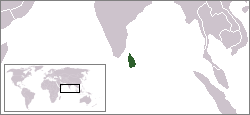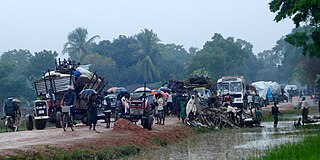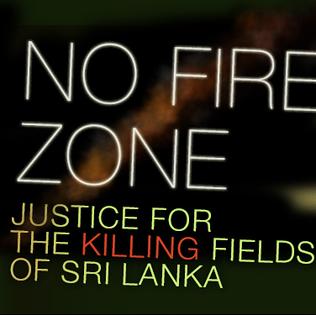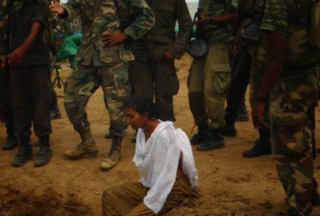
The Liberation Tigers of Tamil Eelam was a Tamil militant organization, that was based in the northern and eastern Sri Lanka. The LTTE fought to create an independent Tamil state called Tamil Eelam in the northeast of the island in response to violent persecution and discriminatory policies against Sri Lankan Tamils by the Sinhalese-dominated Sri Lankan Government.

The Sri Lankan civil war was a civil war fought in Sri Lanka from 1983 to 2009. Beginning on 23 July 1983, it was an intermittent insurgency against the government by the Liberation Tigers of Tamil Eelam led by Velupillai Prabhakaran. The LTTE fought to create an independent Tamil state called Tamil Eelam in the north-east of the island, due to the continuous discrimination and violent persecution against Sri Lankan Tamils by the Sinhalese-dominated Sri Lanka government.

The Vaharai bombing is a disputed event in the Sri Lankan civil war. It occurred on November 7, 2006 when, according to survivors of the incident interviewed by Reuters, the Liberation Tigers of Tamil Eelam fired artillery at Sri Lankan military personnel from near a school where minority Sri Lankan Tamil refugees displaced by the current phase of the Sri Lankan civil war had taken shelter. The Sri Lankan Army returned fire and around 45 civilians were killed. Over 100 were injured and admitted to the local hospitals. However, people who were interviewed by Human Rights Watch claimed that the LTTE did not fire artillery. Further, the rebel LTTE denies firing artillery from close to the school. The incident occurred at around 11.35 a.m close to Kathiraveli, a coastal village in Vaharai peninsula of the Batticaloa district in eastern Sri Lanka.

Lasantha Manilal Wickrematunge was a high-profile Sri Lankan journalist, politician, broadcaster and human rights activist who was assassinated in January 2009.
War crimes during the final stages of the Sri Lankan civil war are war crimes and crimes against humanity which the Sri Lanka Armed Forces and the Liberation Tigers of Tamil Eelam have been accused of committing during the final months of the Sri Lankan civil war in 2009. The war crimes include attacks on civilians and civilian buildings by both sides; executions of combatants and prisoners by both sides; enforced disappearances by the Sri Lankan military and paramilitary groups backed by them; sexual violence by the Sri Lankan military; the systematic denial of food, medicine, and clean water by the government to civilians trapped in the war zone; child recruitment, hostage taking, use of military equipment in the proximity of civilians and use of forced labor by the Tamil Tigers.
The Lessons Learnt and Reconciliation Commission was a commission of inquiry appointed by Sri Lankan President Mahinda Rajapaksa in May 2010 after the 26-year-long civil war in Sri Lanka to function as a Truth and reconciliation commission. The commission was mandated to investigate the facts and circumstances which led to the failure of the ceasefire agreement made operational on 27 February 2002, the lessons that should be learnt from those events and the institutional, administrative and legislative measures which need to be taken in order to prevent any recurrence of such concerns in the future, and to promote further national unity and reconciliation among all communities. After an 18-month inquiry, the commission submitted its report to the President on 15 November 2011. The report was made public on 16 December 2011, after being tabled in the parliament.
The Report of the Secretary-General's Panel of Experts on Accountability in Sri Lanka was a 2011 report produced by a panel of experts appointed by United Nations Secretary-General (UNSG) Ban Ki-moon to advise him on the issue of accountability with regard to any alleged violations of international human rights and humanitarian law during the final stages of the Sri Lankan Civil War. The report is referred to by some as the Darusman Report, after the name of the chairman of the panel.

Sri Lanka's Killing Fields is an investigatory documentary about the final weeks of the Sri Lankan Civil War broadcast by the British TV station Channel 4 on 14 June 2011. Described as one of the most graphic documentaries in British TV history, the documentary featured amateur video from the conflict zone filmed by civilians and Sri Lankan soldiers which depicted "horrific war crimes".

Lies Agreed Upon is a documentary produced by Sri Lanka Ministry of Defence in response to a documentary aired by Channel 4, named Sri Lanka's Killing Fields, about the final weeks of the Sri Lankan Civil War. The documentary gives the Sri Lanka Ministry of Defence response to war crimes accusations and rebuts points made by the producers of the Channel 4 documentary, who presented it as "a forensic investigation into the final weeks of the quarter-century-long civil war between the government of Sri Lanka and the secessionist rebels, the Tamil Tigers." Lies Agreed Upon was first aired at an official function held at Hilton Colombo on 1 August 2011, one and half months after the broadcasting of "Sri Lanka's Killing Fields". Ministry of Defence released another report named Humanitarian Operation – Factual Analysis : July 2006 – May 2009 on the same day.

Callum Macrae is a Scottish filmmaker, writer and journalist currently with Outsider Television, which he had co-founded with Alex Sutherland in 1993.

Sri Lanka's Killing Fields: War Crimes Unpunished is an investigatory documentary about the final weeks of the Sri Lankan Civil War broadcast by the British TV station Channel 4 on 14 March 2012. It was a sequel to the award-winning Sri Lanka's Killing Fields which was broadcast by Channel 4 in June 2011. Made by film maker Callum Macrae, this documentary focused on four specific cases and investigated who was responsible for them. Using amateur video from the conflict zone filmed by civilians and Sri Lankan soldiers, photographs and statements by civilians, soldiers and United Nations workers, the documentary traced ultimate responsibility for the cases to Sri Lanka's political and military leaders. The documentary was made by ITN Productions and presented by Jon Snow, the main anchor on Channel 4 News. The Sri Lankan government has denied all the allegations in the documentary.

The Tamil genocide refers to the various systematic acts of physical violence and cultural destruction committed against the Tamil population in Sri Lanka during the Sinhala–Tamil ethnic conflict beginning in 1956, particularly during the Sri Lankan Civil War, as acts of genocide. Various commenters have accused the Sri Lankan state of responsibility for and complicity in a genocide of Tamils, and point to state-sponsored settler colonialism, state-backed pogroms, and mass killings, enforced disappearances and sexual violence by the security forces as examples of genocidal acts.

No Fire Zone: In the Killing Fields of Sri Lanka is an investigative documentary about the final weeks of the Sri Lankan Civil War. The documentary covers the period from September 2008 until the end of the war in 2009 in which thousands of Tamil people were killed by shelling and extrajudicial executions by the Sri Lankan Army including Balachandran Prabhakaran, the 12-year-old son of the slain Liberation Tigers of Tamil Eelam (LTTE) Chief Velupillai Prabhakaran. The Sri Lankan army has denied the allegations in the documentary. However, on 21 October 2015 the BBC reported that Maxwell Paranagama, a government-appointed Sri Lankan judge, says allegations the army committed war crimes during the long conflict with Tamil Tiger rebels are "credible". He went on to say there was evidence to suggest that footage obtained by the Channel 4 documentary No Fire Zone - showing prisoners naked, blindfolded, with arms tied and shot dead by soldiers - was genuine.

Shoba, also known as Shobana Dharmaraja, was a Sri Lankan Tamil journalist and television broadcaster for the rebel Liberation Tigers of Tamil Eelam (LTTE). She died in the final days of the Sri Lankan Civil War in 2009 with video evidence that she was captured by the Sri Lankan military before being raped, tortured and murdered. A senior United Nations official deemed the footage to be authentic. Amnesty International and Human Rights Watch also verified that it was her.
This Land Belongs to the Army is a 2014 documentary film by Indian journalist and filmmaker Maga.Tamizh Prabhagaran. This film shows Sri Lankan civil war and shows the current post-war status of Sri Lanka. It also shows several controversial acts by the Sri Lankan government and the armed forces including Sinhalization and Land grabbing by the military. The film also features new testimonies from Tamil victims and an exclusive interview with a who is said to be a Sri Lankan Army officer, who speaks about the use of chemical and heavy weapons during the civil war.
The Tamil genocide resolution of 2015 was passed by the Northern Provincial Council on 10 February 2015 seeking an UN inquiry to investigate the genocide of the Tamil people in Sri Lanka by successive Sri Lankan Governments, and direct appropriate measures at the International Criminal Court outlining the Tamil people had no faith in the domestic commission.
The Mullivaikkal massacre was the mass killing of tens of thousands of Sri Lankan Tamils in 2009 during the closing stages of the Sri Lankan Civil War, which ended in May 2009 in a tiny strip of land in Mullivaikkal, Mullaitivu.
Varatharajah Thurairajah, born March 3, 1975, is an Eelam Tamil physician and human rights activist. He was noted as one of the official witnesses for the United Nations investigations on war crimes and human rights violations in Sri Lanka. He is a first-hand witness of the events in the "No Fire Zone" in Mullivaikkal, Mullaitivu; and has revealed information to the world about the planned genocide of Tamils in 2009. He is currently engaged in activities related to creating awareness about the issue.
Sri Lanka’s Rebel Wife: A woman’s search for her missing husband is a documentary by Kannan Arunasalam about missing Tamil rebels who surrendered to the Sri Lankan Army in the final stages of the Sri Lankan Civil War. It deals with the case of Ananthi Sasitharan 's husband EIilan who surrendered to the Sri Lankan army and was never seen again. The film was shortlisted for the DIG Investigative Documentary awards in Modena, Italy and recognised at the 42nd International URTI Grand Prix with the Martine Filippi prize for Discovery.










